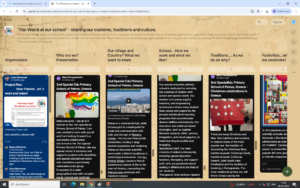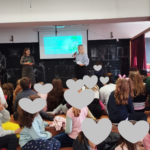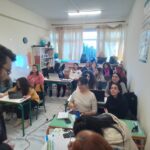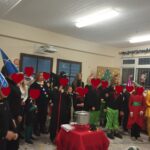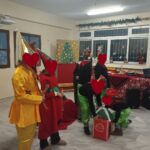Etwinning The world at our school
Video – Patra, our town
Σχ έτος 2024-2025
Our town, what we want to share
Patras is a commercial hub, while its busy port is a nodal point for trade and communication with Italy and the rest of Western Europe. The city has three public universities, hosting a large student population and rendering Patras an important scientific centre with a field of excellence in technological education. The Rio-Antirrio Bridge connects Patras’ easternmost suburb of Rio to the town of Antirrio, connecting the Peloponnese peninsula with mainland Greece.
Every year, in February, the city hosts one of Europe’s largest carnivals. Notable features of the Patras Carnival include its mammoth satirical floats and balls and parades, enjoyed by hundreds of thousands of visitors in a Mediterranean climate. Patras is also famous for supporting an indigenous cultural scene active mainly in the performing arts and modern urban literature. It was European Capital of Culture in 2006.
How we work and what we like
Our special education primary school is dedicated to nurturing the potential of children with autism and special needs. Our mission is to create a joyful, inclusive, and empowering environment where every student feels valued and supported.We provide individualized learning programs that accommodate diverse abilities and interests. Our educators use evidence-based strategies, such as Applied Behavior Analysis (ABA), sensory integration, and visual supports, to make learning accessible and engaging.
Specialized Staff: Our team consists of skilled professionals, including special education teachers, therapists, and support staff, who are passionate about making a difference in the lives of our students.
Therapeutic Interventions: Speech therapy, occupational therapy, and social skills training are seamlessly integrated into our daily activities to support holistic development.
Sensory-Friendly Spaces: The school environment is designed to meet the sensory needs of our students. From calm zones to sensory rooms, every corner of our campus is thoughtfully crafted to reduce anxiety and promote focus.
Family Collaboration: We recognize that families play an integral role in a child’s education. Through regular communication, workshops, and events, we work closely with parents to ensure a consistent support system.
Christmas celebrations in Greece
There are many Christmas and New Year traditions and customs in Greece! Some of the most popular are: the tradition of decorating the Christmas Boat, traditional greek Christmas Carols, traditional greek Christmas Sweets, Saint Basil’s cake (Vasilopita) and the tradition of breaking a Pomegranate. The most traditional symbol you will find in Greece during the Christmas holidays is a small boat “Karavaki” decorated with lights, usually placed in the main square of a town and close to the more international Christmas tree. The small boat or “Karavaki” is rooted in the traditions of a country with a symbiotic relationship with the sea. In many Greek islands the Christmas boat remains the most popular ornament of the holiday season. Greek Christmas Carols (Kalanda) are the songs that are sung the three caroling days in Greece. The morning of Christmas Eve (24th December), the morning of New Year’s Eve (31st December)and the morning of the Eve of Epiphany (5th January). These days children in groups go from house to house to sing the carols. They sing the carols accompanied by metal triangles and sometime drums and they are given a small amount of money by the residents of each house. The most traditional sweets that every Greek household prepares and serves throughout Christmas holidays are kourabiedes, melomakarona and diples. Apart from these traditional sweets, there is also Saint Basil’s cake (vasilopita), a traditional Greek cake or bread served at midnight of New Year’s Eve to celebrate the life of Saint Basil. After baking the cake, a coin is inserted through the base and when cut the person who finds the coin is said to be granted luck for the rest of the year. According to Greek Christmas traditions, on New Year’s Eve just after midnight the householder stands outside the front door of the house and breaks a pomegranate by throwing it on the doorstep. The seeds of the fruit spread on the floor mean happiness and health to the family.
